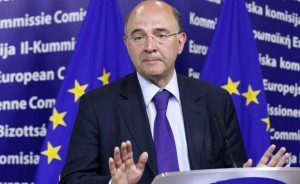 Pierre Moscovici, the European Commissioner for Economic and Financial Affairs, Taxation and Customs, announced on Wednesday in Brussels the proposals of the European Commission for the European VAT rules.
Pierre Moscovici, the European Commissioner for Economic and Financial Affairs, Taxation and Customs, announced on Wednesday in Brussels the proposals of the European Commission for the European VAT rules.
According to the Commission’s announcement, Brussels proposes „a fundamental change in the current VAT rules, a change aimed at taxing the sales of goods from one EU country to another in the same way that goods are sold within the member states.”
Commissioner Moscovici has announced that he will try to obtain the agreement of the member states on four principles on which a „single European area” to function in the future in the field of the value added tax:
Combating fraud.
VAT will be charged for cross-border trade between enterprises. Currently, cross-border trade is exempted from the VAT, generating a loophole that unscrupulous companies use to collect VAT, then disappear without sending the money to the government.
One Stop Shop.
It will be more simple for companies that sell goods across borders to meet their VAT obligations in the “One Stop Shop” system. Traders will be able to make statements and payments using a single online portal in their own language and according to the same administrative rules and templates as in their country of origin. Member states will pay their VAT directly, as it is already the case for all sales of electronic services.
More consistency.
A change to the „destination” principle, according to which the final VAT amount is always paid to the member state where the end consumer is located and is charged at the rate set by that member state. This was an old commitment of the European Commission, supported by the member states. The mechanism already works for the electronic services sales.
Less bureaucracy.
Simplifying the billing rules, which would allow vendors to issue invoices in accordance with their own country rules even when transactions are cross-border. Companies will no longer need to prepare a list of cross-border transactions for their tax authority (the so-called „recapitulative statement”).
Proposals made by Pierre Moscovici also introduce the notion of „Certified taxable person” – a category of trusted business that will benefit from much more simple and less time-consuming rules.
Commissioner Moscovici also spoke, without further elaborating, about some „quick solutions” that would come into force in 2019.
Quick solutions, more precisely short-term measures, have been explicitly requested by member states to improve the day-to-day functioning of the current VAT system until all member states have completed and approved the new VAT system.
According to the procedures, the detailed legislative proposal will be forwarded for analysis to the member states through the European Council and the European Parliament for consultation. Following this process, the Commission will present in 2018 the detailed draft of the „VAT Directive” reform issued in 2006.
Proposals announced by Commissioner Moscovici occur a few days after his directorate published a study on the VAT gap at the EU level, according to which Romania was in 2015 the member state with the highest gap between the VAT supposed to be collected and the VAT effectively collected.
The situation was similar in 2014.









